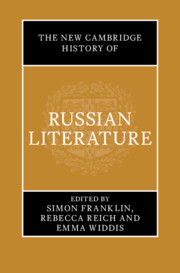Book contents
- The New Cambridge History of Russian Literature
- The New Cambridge History of Russian Literature
- Copyright page
- Contents
- Figures
- Contributors
- Acknowledgements
- On Transliteration, Names, and Dates
- Introduction
- History 1 Movements
- History 2 Mechanisms
- History 3 Forms
- History 4 Heroes
- 4.1 The Saint
- 4.2 The Ruler
- 4.3 The Lowly Civil Servant
- 4.4 The Peasant
- 4.5 The Intelligent
- 4.6 The Russian Woman
- 4.7 The New Person
- 4.8 The Non-Russian
- 4.9 The Madman
- 4.10 The Émigré
- Index
- References
4.9 - The Madman
from History 4 - Heroes
Published online by Cambridge University Press: 31 December 2024
- The New Cambridge History of Russian Literature
- The New Cambridge History of Russian Literature
- Copyright page
- Contents
- Figures
- Contributors
- Acknowledgements
- On Transliteration, Names, and Dates
- Introduction
- History 1 Movements
- History 2 Mechanisms
- History 3 Forms
- History 4 Heroes
- 4.1 The Saint
- 4.2 The Ruler
- 4.3 The Lowly Civil Servant
- 4.4 The Peasant
- 4.5 The Intelligent
- 4.6 The Russian Woman
- 4.7 The New Person
- 4.8 The Non-Russian
- 4.9 The Madman
- 4.10 The Émigré
- Index
- References
Summary
The figure of the madman has been invoked in Russian literature from the medieval period to the present day. This chapter investigates the evolution of that tradition with an emphasis on the period from Joseph Stalin’s death in 1953 to the Soviet Union’s collapse in 1991. It identifies four strains of literary madness: the divine madman, exemplified by the holy fool who tests society’s virtue and speaks truth to power; the creative madman, whose irrational behaviour stems from poetic inspiration and the generative power of the word; the rational madman, who follows a logical system to pathological extremes or inverts that paradigm by revolting against reason; and the political madman, whose sanity is often pathologised by a society that itself has lost its mind. Together, these paradigms of madness constitute an intertextual web of allusions and character types that have been embodied and amended over time.
Keywords
- Type
- Chapter
- Information
- The New Cambridge History of Russian Literature , pp. 824 - 841Publisher: Cambridge University PressPrint publication year: 2024

